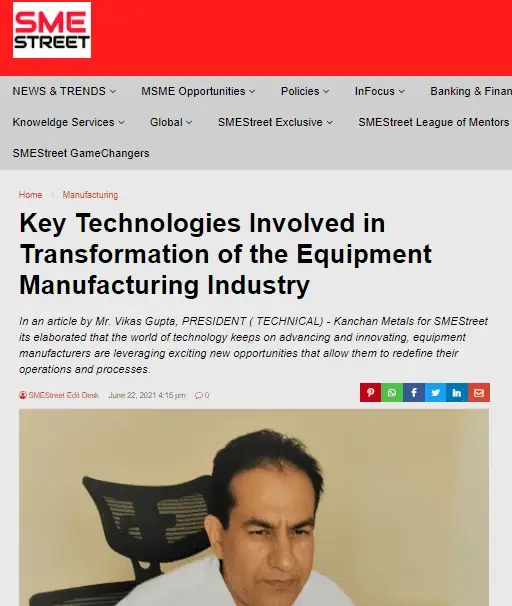An article by Mr. Vikas Gupta, PRESIDENT (TECHNICAL) Kanchan Metals- SME Street
As the world of technology keeps on advancing and innovating equipment manufacturers are leveraging exciting new opportunities that allow them to redefine their operations and processes. From advanced robatics to big data analytics and computer vision in warenouses, manufacturing technologies are huge in number and bringing unprecedented transformation. The vast choice often makes it difficult for manufacturers to decide which types of technologies are worth investing in and which can wait. Some of the sophisticated technologies being leveraged by equipment manufacturers include 3D printing, Internet of Things (IoT), Artificial intelligence etc. to reduce human intervention, improve operations speed and minimise errors.
Technologicat advancements have had various transformative effects on businesses. Some of these are compiling massive amounts of data for intelligent machine learning usage of the internet by various objects to communicate etc. Such advancements have improved manufacturing efficiencies and are well-received in the soctor As keep advancing into a new phase of industrial developments, we need to remember that the smerging industry is all about connecting humans and machines. The ongoing pandemic only accelerates the fusion.
As the trend continues, it is worth exploring the ways these technologies are fundamentally transforming the equipment manufacturing industry as we know it
The industries internet of Things (not)
The successful results of tot in mainstream service industries advocated its use in production focalties. As result, intreconnected devices used within industrial praduction facilities are today togged of devices. The focus of oflot in the equipment manufacturing sector is on seamless process chains and networking of machines
in induatinol emsironments, it is being increasingly used for applications in outsmetive plants, industrial factories pharmaceutical plants, electronics, 768 supply chains de well as in a retineries some of the possibilities being created by tot in the manufacturing industry are apsimization of processes, greater Texibility of production processes, increasing degree of automation more accurate predictions of machine condition and more efficient maintenance etc
Robetica
The role of smart robots is expanding in industrial production and equipment manufacturing Robots con help autonsate repetitive tasks, reduce errors, enhance accuracy and help manufacturers focus on more productive areas. They improve efficiency right from handling raw material to finished product packing, are highly flexible and can be customized to perform complex job and highly cost-effective even for small manufacturing units. With continuous advances in robotics technology, it is more likely to become smarter, cheaper and more efficient
Nanotechnology
Though the technology is still in the advancing stage, it will be indispensable to every manufacturing industry soon, it can deliver highly effective results in the industry such as creating stable and effective lubricants that are required in many industrial applications. Further, tire manufacturers are using polymer nana-composites in high-end tires to make them wear resistance
Nanotechnology
Though the technology is still in the advancing stage, it will be indispensable to every manufacturing industry soon Itcan deliver highly effective results in the industry such as creating stable and effective lubricants that are required in many industrial applications. Further, tire manufacturers are using porymer nane-composites in high-end tires to make them wear resistance
3D Printing
3D printing has delivered amazing results in the product design field and is all set to take the equipment manufacturing world by storm According to Markets and Markets, the global 30 printing market size is estimated to reach USD 34.8 billion by 2024. Also known as additive manufacturing the technology is faster agile and innovative. 30 printing significantly reduces design to production time offers greater tiesibility in production simplifies the production of small-lot products from machine parts to prototypes, reduces manufacturing lead times drastically, minimizes waste etc.
Blockchain
Blockchain is hotly tipped as a technology with huge potential to transform business and day to day life From technological perspective blackchain technology has pushed new bouridanes but looking at its potential, a lot of disruption is foreseen in the future. Many big prayers are confident that it will provide rea value to industries and government organisations in need of innovative salutions for record keeping Industrial manufacturers are currently using it to secure third-party collaborations within the manufacturing Industry as well as secure supply chains
Artificial Intelligence
Al is being aggressively used across various sectors. Industrial manufacturers are using it on the plant floor and in the front office to damate various tasks. In the future, Al-powered forecasting will become more advanced that will help equipment manufacturers align their supply chain with demand projections
Big Data
The manufacturing industry is complex in terms of the variety of products and their features. As far as expanding production is concerned, companies can leverage big data to tackle the challenges. As the process of capturing and saving data is evolving, new standards in updating, sharing, transferring querying searching and information privacy are arising. When integrated with big data, manufacturing software like CMMS, MES, and manufacturing analytics can help find patterns and solve any problems. To summarise, big data ensures better quality assurance, customised product design, manages the supply chain and identifies potential risk
Summing Up!
Technologies for industrial manufacturing reduce labor costs and waste as well as improve efficiency making future manufacturing cheaper and more environment-friendly Additionally, improved quality control ensures superior equipment which benefits both the customer as well as manufacturer

